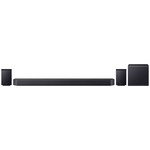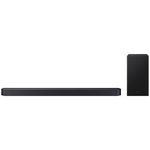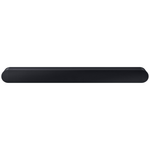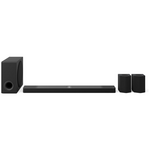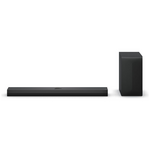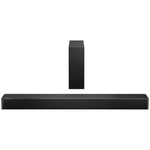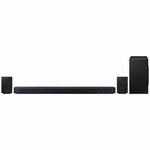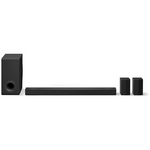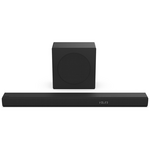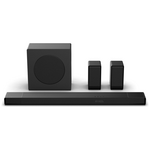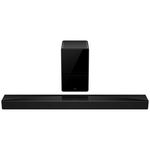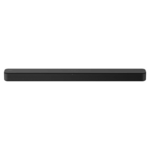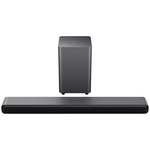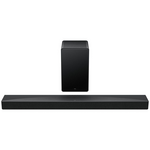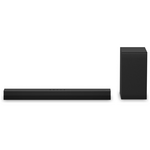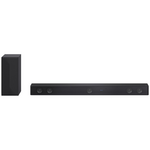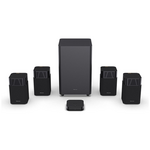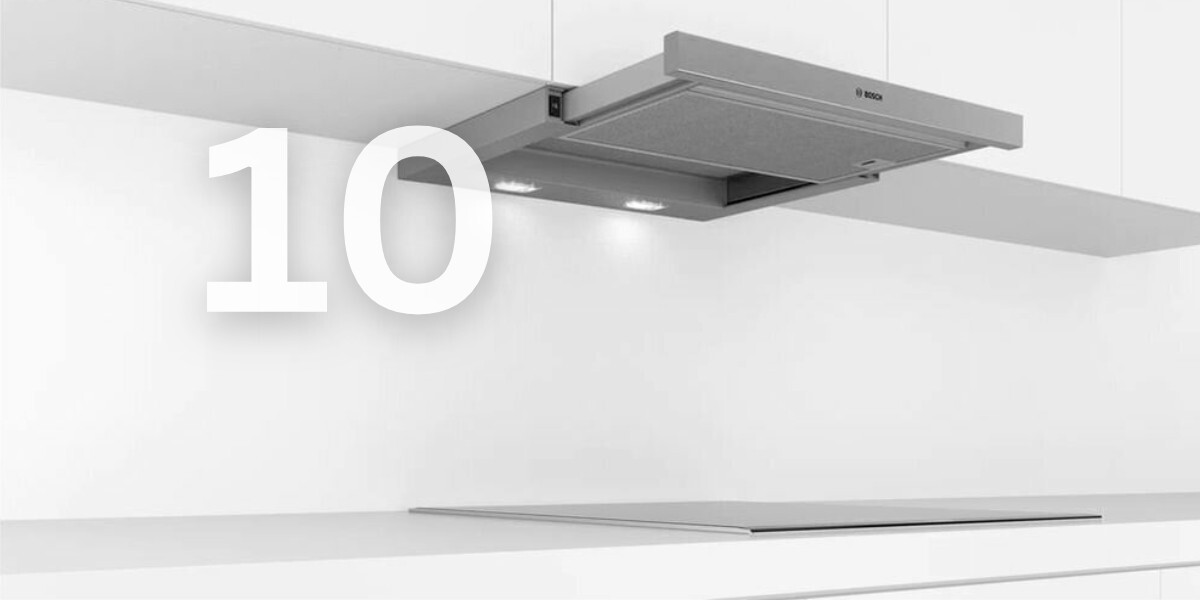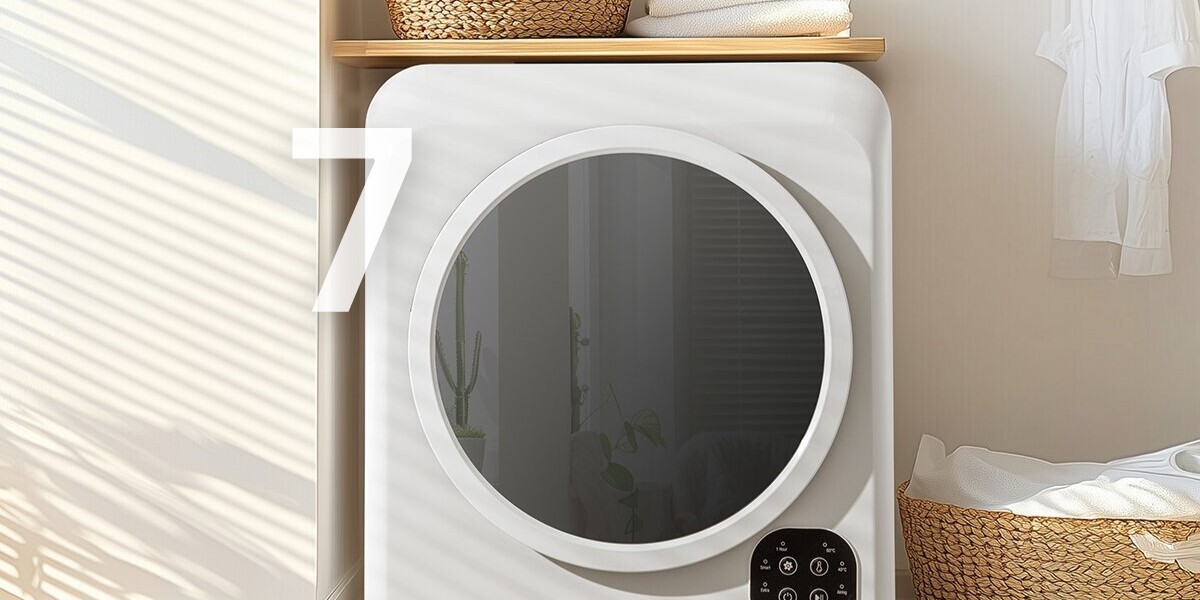
Your Cart
Your shopping cart is currently empty.
TV, Audio & Electronics
From movies and music to streaming and gaming, let's talk TV, tech and home entertainment!
TV, AUDIO & ELECTRONICS | 11 MARCH, 2025
9 MIN READ
Do you really need a soundbar for your TV?
What does advanced built-in audio mean for soundbars?
If you’ve bought a new TV in recent years, you’ll have noticed how slimline and frameless it is compared to your previous one. While this makes for an incredible viewing experience, it also means there’s less room for built-in speakers - and that’s where soundbars come in. But do you really need a soundbar to enjoy great sound, or is your TV's audio quality good enough on its own?
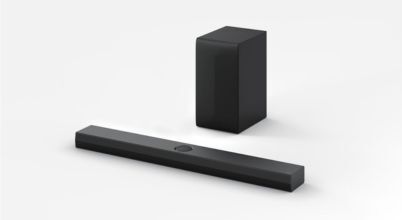
An LG soundbar and subwoofer
What is a soundbar?
A soundbar is a type of speaker specifically designed to improve the clarity of dialogue and sound effects, and enhance bass, volume and sound projection. Soundbars are usually positioned directly beneath the TV screen they are linked to. They often come bundled with a subwoofer speaker, for greater bass, and sometimes additional speakers for true surround sound.
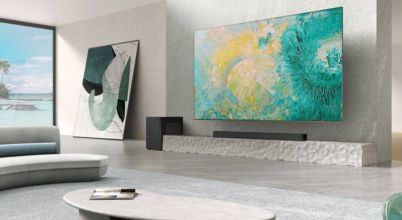
A TCL brand soundbar, subwoofer and TV
Why are soundbars so common now?
Soundbars first started appearing as TV accessories in the early 2000s, but they’ve really taken off in the last decade. As TVs have become thinner, larger, and almost frameless, manufacturers have had to make trade-offs when it comes to TV speakers. There simply isn’t enough space in a flat-screen TV for the components needed for awesome sound.
The bulkier design of older-style TVs allowed for larger built-in speakers with woofer drivers, which provided better bass response than today’s ultra-thin designs. Despite this all-in-one convenience, though, they wouldn’t match the deep bass and immersive sound of today’s dedicated soundbar and subwoofer setups, so let’s not shed too many tears for them.
As we’ve become quickly accustomed to advances in TV display technology - from 4K resolution to QLED and OLED screens, Dolby Vision and HDR - we’ve come to expect immersive sound that matches the visuals.
Are soundbars worth it for TVs?
Yes - soundbars are a popular upgrade because modern flat-screen TVs often compromise on audio quality due to their slim design. A soundbar delivers clearer dialogue, richer bass, and a more immersive experience, making it ideal for movies, gaming, sports, and everyday viewing.
Has built-in TV audio got worse?
Not really, it just hasn’t improved in line with the visuals. Some premium smart TVs from brands like Samsung, Sony, LG, Hisense, and TCL have excellent built-in speakers. But even when manufacturers use tech like advanced processing, Dolby Atmos and DTS:X support, built-in speakers still struggle to match the audio quality of a dedicated speaker system due to:
Lack of bass – built-in TV speakers are too small to produce deep, rumbling woofer sounds, making action movies and music feel flat.
Limited directionality – Without rear speakers or a surround sound system, TV audio lacks the depth needed for a true immersive audio experience.
Volume limitations – Small TV speakers can’t push enough air to deliver great sound at high volumes without distortion.
What exactly does a soundbar do?
Whether you have a soundbar on its own or with supplementary wireless subwoofer or surround speakers, it can enhance your TV’s sound in several ways:
Better sound clarity – Dialogue and sound effects are clearer, especially in TV shows and movies.
Stronger bass – A subwoofer delivers richer low-end sounds. Don’t just see the explosion, feel the rumble in your sofa.
Surround sound experience – Soundbars support Dolby Atmos or DTS:X, bouncing audio off walls for a cinematic experience.
Wireless connectivity – Most models have Bluetooth and some have Wi-Fi and smart home compatibility (Alexa, Google Assistant, Apple AirPlay).
Multiple inputs – You can connect them via HDMI ARC, optical, or HDMI cable, making them versatile for gaming consoles, Blu-ray players, and streaming services.
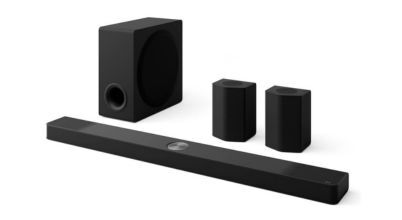
This 9.1.5 LG soundbar bundle has impressive output
The numbers in a soundbar system’s name (e.g. LG 2.1 Ch, Samsung 5.0 Ch or Hisense 5.1.2 Ch) indicate its speaker configuration. The first number refers to the number of speakers within the soundbar itself, which can range from 2 to several. The second number indicates the subwoofer, and the third number, if there is one, refers to the number of speakers in any additional surround sound units.
So, do you really need a soundbar?
If you live in a quiet household and tend to keep the volume low, or the telly’s more for background noise than anything, your TV’s built-in speakers may be fine on their own.
However, if you want sound that matches your TV’s incredible visuals, you struggle to hear dialogue clearly, or you want to use it to stream music or integrate with your smart home system, it’s well worth getting a soundbar.
Soundbar vs TV Speakers Comparison Table
Feature | Modern TV Speakers | Soundbar Audio |
|---|---|---|
Audio Quality | Often thin, lacks bass, small built-in drivers | Richer, fuller sound with dedicated speakers and tweeters |
Dialogue Clarity | Can be muffled or echoey | Enhanced speech clarity and dedicated voice modes |
Bass Performance | Minimal to none | Built-in subwoofer or external sub options |
Surround Sound Support | Limited virtual surround, no depth | Dolby Atmos, DTS:X, and 3D spatial audio options |
Setup & Connectivity | Built-in, no external gear | Simple HDMI ARC/eARC, Bluetooth, and wireless connections |
Ideal Use Cases | Casual daytime watching | Movie nights, gaming, sports, home entertainment |
Treat your senses to immersive soundbar audio
Samsung B450F B Series 2.1ch Soundbar HW-B450F-XY
Yet to be reviewed
TCL 5.1.2ch Dolby Atmos Soundbar With Wireless Subwoofer Q75H
Yet to be reviewed
TCL 2.1 Ch Soundbar with Wireless Subwoofer S55H
Yet to be reviewed
TCL 5.1ch Soundbar With Wireless Subwoofer Q65H
Yet to be reviewed

10 Movies & TV Shows that showcase soundbars and subwoofers
Appliances Online’s community of screen buffs doesn’t always see eye to eye on the latest flicks and shows, but did manage to agree that the deep bass and surround sound effects in these movies and TV shows is awesome for showcasing the power of a soundbar and subwoofer combo.
Movies
Dune (2021) – Hans Zimmer’s powerful score, deep bass-heavy effects, and atmospheric surround sound make this a true cinematic experience. Careful the bass doesn’t attract those sandworms...
Top Gun: Maverick (2022) – The roaring jet engines, immersive cockpit sounds and energetic soundtrack sound incredible.
Mad Max: Fury Road (2015) – The mix of high-speed chases, deep explosions and adrenaline-pumping sound effects benefits hugely from a woofer and rear speakers.
Interstellar (2014) – A perfect test for subwoofers, with deep rumbling space travel sequences and a soundtrack that deserves the best sound quality.
John Wick: Chapter 4 (2023) – Intense fight scenes, gunfire, and an immersive surround sound experience make this a great test for your home entertainment’s audio setup.
TV shows
The Mandalorian (Disney+) – The blaster shots and spaceships of the Star Wars universe, coupled with Ludwig Göransson’s score, fill the living room.
Stranger Things (Netflix) – The eerie sound effects, '80s synth-heavy soundtrack and deep bass from the Upside Down do as much as the images to get you on the edge of your seat.
Game of Thrones (HBO/Binge) – Large-scale battle scenes, dragon roars and epic orchestral music are best experienced with an epic audio set up.
The Last of Us (HBO/Binge) – Atmospheric, suspenseful, and featuring surround sound effects that create a genuinely tense audio experience.
Formula 1: Drive to Survive (Netflix) – The roar of F1 engines and crowd noise make full use of Dolby Atmos and DTS:X technology.
Each of these showcases the best sound capabilities of a soundbar and subwoofer setup, creating a home theatre experience that just isn’t possible with standard TV speakers.
Get your soundbar fast with Free, Next Day Delivery*
We deliver soundbars (and TVs, wireless speakers and everything else you need for your home theatre set up) to 95% of Australians with Appliances Online's legendary FREE delivery!
Plus, we can usually get your order to you by the next day (Mon-Fri) when it's in stock. If you need some pointers on getting the best soundbar, read our Speakers and Audio Buying Guide, call our friendly team 24/7 on 1300 000 500 or message us via the chat icon at the bottom of your screen.
FAQs - Soundbars vs TV Speakers
FAQ | Answer |
|---|---|
What is a soundbar? | A soundbar is a long, slim speaker system that sits under or in front of your TV. It contains multiple speakers inside one unit (and sometimes a separate subwoofer) to deliver much better sound than built-in TV speakers. |
Why do modern TVs have poor sound quality? | As TVs get thinner, there's less room for decent speakers. This means most flat-screen TVs have small, downward or rear-firing speakers, which often lack clarity and bass. That’s where a soundbar makes a big difference. |
Are soundbars worth it for TV? | Absolutely. If you watch a lot of movies, sports, or gaming, a soundbar will vastly improve your experience. Even budget soundbars offer noticeable upgrades in volume, clarity, and immersive sound compared to built-in TV speakers. |
Can I connect a soundbar to any TV? | Yes - nearly all TVs from the past 5-10 years support soundbar connections via: |
Do I need a subwoofer with a soundbar? | Not always. Some all-in-one soundbars offer decent bass, but if you want that cinema-style rumble during explosions or music, a subwoofer (either included or optional) is ideal. |
Is a soundbar better than a home theatre system? | For most people - yes. Soundbars are easier to set up, take up less space, and still deliver excellent surround sound via virtual 3D processing like Dolby Atmos, without needing rear speakers or an AV receiver. That being said, if I had the choice of an Home Theatre System vs a Soundbar, I'd lean Home Theatre, but that's just me! |
What are the best soundbar brands in Australia? | Top brands in 2025 include: |
Can I use my soundbar for music too? | Yes! Most soundbars support Bluetooth, Chromecast, or AirPlay, allowing you to stream Spotify or Apple Music straight from your phone or smart home device. |

Oli is Appliances Online's editor and blogger, with almost two decades of lifestyle-related writing and editing to his name. With a mission to help you buy better and live smarter, his brand loyalty will forever belong to the appliance manufacturer that develops a self-emptying dishwasher.
Latest Articles
KITCHEN
24 FEBRUARY 2026
10 of our top best selling rangehoods in Australia 2026
The key to clearer air and cleaner surfaces in your kitchen
LAUNDRY
17 FEBRUARY 2026
If you suffer from allergies, a clothes dryer could be a game-changer
How indoor drying helps manage itchy eyes and sneezing
KITCHEN
5 FEBRUARY 2026
What are dishwasher place settings?
Find the perfect dishwasher capacity for your household
LAUNDRY
3 FEBRUARY 2026
7 of our top best selling vented dryers in Australia 2025-26
Need a stackable or wall-mountable tumble dryer?
More Like This
KITCHEN
24 FEBRUARY 2026
10 of our top best selling rangehoods in Australia 2026
The key to clearer air and cleaner surfaces in your kitchen
LAUNDRY
17 FEBRUARY 2026
If you suffer from allergies, a clothes dryer could be a game-changer
How indoor drying helps manage itchy eyes and sneezing
KITCHEN
5 FEBRUARY 2026
What are dishwasher place settings?
Find the perfect dishwasher capacity for your household

